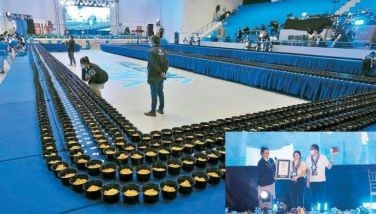Filipino students need not lag in academic and character development
In the past weeks the banner headline stated how the Philippines ranked lowest in academic competencies among 79 countries that participated in an international assessment of the performance of high school students. This was already foreseen by the 1990 ECOM Senate Congressional survey of all schools in the Philippines. Trying to meet the summons of UNESCO DG Koichiro Matsuura in 1990 to inject the missing quality in education, I signed an 18-year MOA during the term of Education Secretary Edilberto de Jesus, with Region 3 Director the late Vilma Labrador to establish the EFA-DAKAR Pilot project for quality Basic Education at the Pulung Bulu Public School in Angeles, Pampanga. We just concluded this project successfully last year.
In 1987 then DECS Secretary Quisumbing made DECS collaborate with a task force of nine preschool experts to upgrade and standardize preschool curriculum, teacher training and organizational criteria on a national scale. I was one of them. Supported by DECS Order No. 29, 87, CONCEP (Coordinating Council for Early Childhood Education in the Philippines), it gathered the major preschool administrators from both private and public schools in the Philippines to review the revised preschool requirements regarding the curriculum, teacher training and school building with school superintendents. Three national conventions were held for consulting preschool owners and teachers between 1987 and 1991 coinciding with EDCOM the Senate-Congressional survey of all schools from kindergarten to tertiary education. The Philippines was one of the first 35 countries then who ratified the Convention on the Rights of the Child (CRC).
Frequent tampering with kindergarten and Grade I
The major work of CONCEP was to try out a more advanced Early Childhood curriculum. A comparison between the early attempts of the DECS preschool program with that of UP ECE combined with the Montessori preschool system was done. There was not enough time to effectively carry out the latter. The DECS proposal for preschool teacher training only reiterated the basic four-year Bachelor of Arts and Bachelor of Science course plus 18 units of Education and Child Psychology subjects, unlike the CONCEP guided teacher training program which focused the attention of the fours and fives much more than mere workbooks.
The P100M budget was allotted to early Childhood Education by Senator Angara, who headed the 1991 National Survey of Education (EDCOM). I recommended that the budget should set up a separate Center for Early Childhood Education to focus on the concerns of very young children whose unique nature will not respond to traditional teaching. The monthly meeting of CONCEP with the DECS-BEE (Bureau of Elementary Education) officials for eight years resulted in the publication of the UNESCO sponsored preschool manual “Planning the Young Child’s Education” not only for school administrators and teachers but for parents as well and an accreditation plan for quality preschool program.
Unfortunately, the DECS’ Bureau of Elementary Education has decided to use the money for public elementary schools in the three selected regions of the country. Dr. Edith Carpio of BEE, who has been sitting with me in the UNESCO National Commission (Education Committee) to represent DECS, specified that the P100 million will convert the first month of Grade I in selected public schools into a kindergarten program referred to as “the eight week” program. This kind of spending was like pouring water into a sieve and eventually it was proven ineffective.
Predicting the ideal launching pad for whole Philippine education system
In the 1990 to 1991 EDCOM made a survey of education in 13 regions of the country by the Senate and Congress. I sat as one of the many consultants. After watching my presentation of the Pagsasarili preschool with a slide projector and sample Montessori apparata, a DECS official remarked: “Whew! I can clearly see how dynamic the preschool program can be if it uses the Montessori system. It will surely be the launching pad for the whole educational system of the Philippines. I see the enormous overhauling of each department if preschools will be so advanced, then the elementary schools will have to be moved up as well as high schools.” Was the gentleman from DECS alarmed or delighted by such a prospect?
In my perception, DECS has the money but refuses to accept other well-proven educational philosophies and practices. DECS ultimately had to admit that the $240 million PRODED plan spent on retraining public elementary school teachers failed.
Unique nature of preschoolers does not respond to traditional teaching
What should school reforms be like in the elementary schools? Grade I teachers in the public schools are the unhappiest teachers. Without any preschool background, the Grade I students can be very stubborn in learning. The DECS should have done away with the Minimum Learning Competency (MLC) goals for Grade I providing only very easy reading, writing and arithmetic lessons to the seven-year-old public school kids who are perceived wrongly to be capable of achieving on a very low level. This is a serious offense to the six- to 12-year-old elementary school children, who, by nature has an enormous reasoning power. Now that DepEd is bent on the K to 12, suddenly, the five-year-old children have been prematurely accepted into Grade I. (Public grade schooler students also lose their self-esteem since their schools are referred to as mababang paaralan.)
For the past 30 years three- to five-year-old children in our affordable Pagsasarili preschools all over Luzon have easily learned to read “kartilla” and write monosyllabic words, count to 1000, work with geography and history materials and speak English... acquiring the competencies of a third grader.
The social revolution on behalf of the ‘il cittadino dimenticato’ (the forgotten citizen)
We are racing against time. The powerhouse of the country is ignited in early childhood. Let us be inspired by Dr. Maria Montessori who describes her work as “an effort to bring about a great social revolution on behalf of the ‘forgotten citizen’ (it cittadino dimenticato) whose rights have never been properly recognized by society.”
(For feedback email to precious.soliven@yahoo.com)
- Latest



























